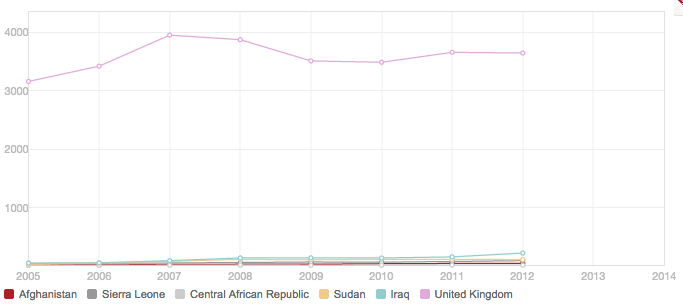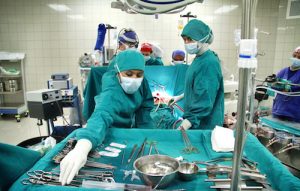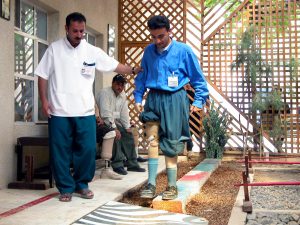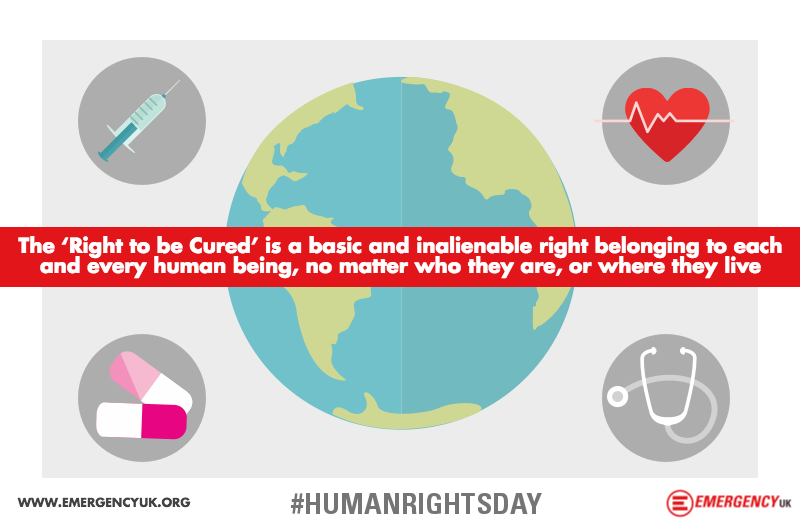Ajmal and his nephew were riding a motorcycle to visit his father in the hospital…

#HumanRightsDay: The Right to Health
Article 25 of the Universal Declaration of Human Rights states ‘everyone has the right to a standard of living adequate for the health and well-being of himself and of his family, including food, clothing, housing and medical care’. Yet, around the world, so many individuals are denied this right due to poverty and war. The disparity between the levels of access to and quality of healthcare around the world is colossal.
The average citizen of the United Kingdom can expect to welcome in their eightieth birthday. They can do so safe in the knowledge that a comprehensive, free at the point of access, and high-quality health care system is waiting for them should they fall ill or injure themselves. And if they choose to have a child during their life, they can expect their daughter or son to live to see their fifth birthday; only 0.5% of infants die under the age of 5 in the UK. It’s also extremely unlikely that a mother will die from pregnancy-related causes or termination of a pregnancy, with only approximately 8 women perishing from such causes for every 100,000 live births. Arguably, most people living in the UK can indeed access a ‘standard of living adequate for the health and well-being of himself and of his family, including food, clothing, housing and medical care’. But when you look at the same statistics for the countries around the world in which EMERGENCY operates, you see a very different story.
In Sierra Leone and the Central African Republic (C.A.R), countries both struck by poverty and civil war, life expectancy is 45 and 49 respectively. That’s not much over half of the UK’s life expectancy. The gulf widens even further when you look at the amount spent on healthcare per person. The following graphs chart the sum of public and private health expenditures, measured in current U.S. dollars, covering the provision of health services (preventive and curative), family planning activities, nutrition activities, and emergency aid designated for health. The first graph compares these figures between Afghanistan, Sierra Leone, Central African Republic, Sudan, and Iraq. Citizens in these countries can expect less than $250 a year toward the provision of their healthcare.

Whilst this is clearly quite a small amount (under £1 a day), this graph alone isn’t particularly illuminating. It’s only when you examine this data in a wider context – comparing it to richer nations – that it becomes striking. This second graph includes the same statistic for the United Kingdom, compared to the previous countries. The colossal difference between the figures is clear.

The story is the same when infant and maternal mortality are taken into consideration. Whilst the UK’s under-5 mortality is a mere 0.5%, the figure ranges from 3.4% in Iraq to 16.1% in Sierra Leone. That means that, in Sierra Leone, 161 out of every 1,000 children under five in the country will die. And compared to the UK’s approximately 8 mothers in every 100,000 live births dying from pregnancy-related causes, in Afghanistan that figure is 400 women, in Central African Republic it is 880 women, and in Sierra Leone it is a staggering 1,100 women.

 It’s clear that the ‘right to a standard of living adequate for the health and well-being of himself and of his family, including food, clothing, housing and medical care’, is implemented extremely unevenly around the world. If you’re from a relatively wealthy country, your life will likely be longer, and healthier. Yet if you’re from a relatively poor country, or one stricken by war, you’re unlikely to be as fortunate.
It’s clear that the ‘right to a standard of living adequate for the health and well-being of himself and of his family, including food, clothing, housing and medical care’, is implemented extremely unevenly around the world. If you’re from a relatively wealthy country, your life will likely be longer, and healthier. Yet if you’re from a relatively poor country, or one stricken by war, you’re unlikely to be as fortunate.
At EMERGENCY, we believe that everyone has the basic and inalienable right to be cured, and we want to see this implemented around the world. For everyone. No matter who they are, or where they live, or what they believe. This belief impacts and unites every facet of our work.
This is why we build hospitals in conflict and post-conflict regions, where countries’ health care facilities have often been destroyed by war, or have fallen into disuse through lack of investment. By building and renovating hospitals, we aim to contribute to the rebuilding and bolstering of local health care infrastructure, the livelihoods of local communities, ultimately helping to strengthen health care systems and foster sustainability.
 In order to embed this sustainability, we prioritise the training of local staff as doctors, nurses, and midwives. We want to build up expertise in our national staff, and to eventually hand them control of our hospitals once self-sustainability is achieved. In addition to medical training, we also run vocational training programmes and work opportunities for individuals who have been maimed or left without social and financial support due to war.
In order to embed this sustainability, we prioritise the training of local staff as doctors, nurses, and midwives. We want to build up expertise in our national staff, and to eventually hand them control of our hospitals once self-sustainability is achieved. In addition to medical training, we also run vocational training programmes and work opportunities for individuals who have been maimed or left without social and financial support due to war.
We also want to remove the barriers that prevent everyone having access to health care. The communities we work in often have limited or no access to health care, meaning that we reach those who are most in need. But our approach goes beyond the provision of just primary health care: we believe that the tools to save a life, many or few, effective or useless as they might prove to be, must always be available to all. Our healthcare is always free-of-charge, and of the highest standard available. We practise medicine without discrimination. We practise medicine built upon human rights.





